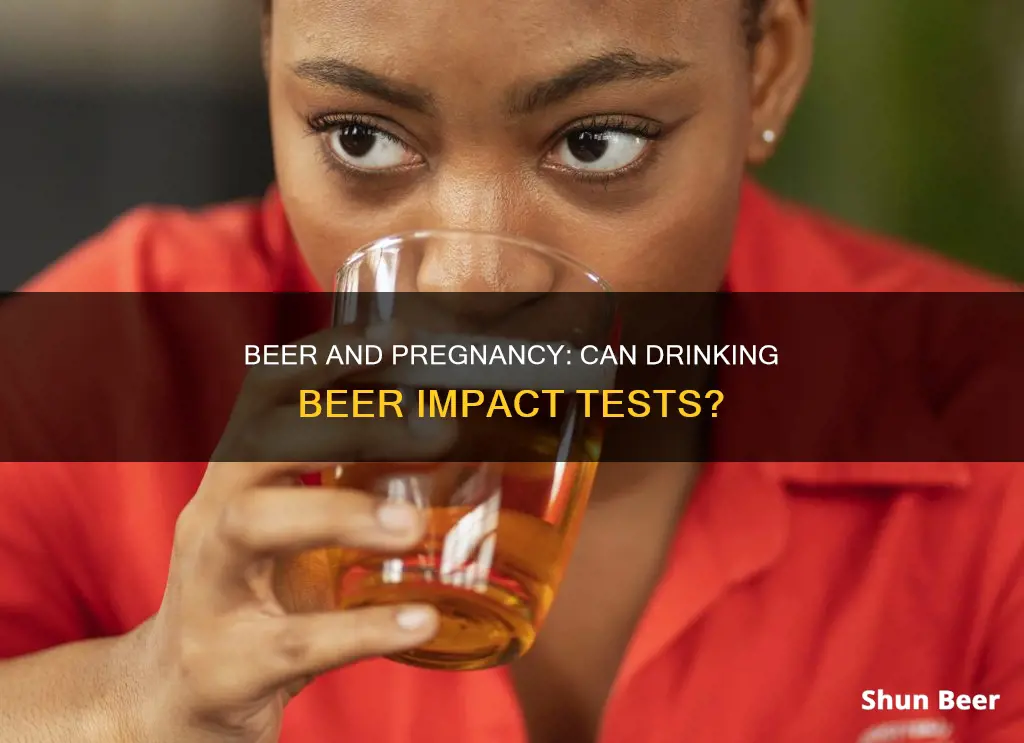
Drinking alcohol while pregnant is generally not recommended by medical professionals. Heavy drinking during pregnancy has been linked to fetal alcohol syndrome (FAS), which can cause babies to be born prematurely and with physical and neurological abnormalities. However, the effects of light drinking are less clear, with some studies suggesting that small amounts of alcohol early in pregnancy may not be harmful to the mother or baby. While alcohol does not directly affect the results of a pregnancy test, it can have an indirect effect by altering hydration levels, potentially leading to a false negative result. Therefore, it is generally recommended to avoid alcohol when trying to conceive and to consult a doctor for personalized advice.
| Characteristics | Values |
|---|---|
| Can beer give a positive pregnancy test? | No, beer does not directly affect the results of a pregnancy test. |
| What does a pregnancy test detect? | Human Chorionic Gonadotropin (hCG), the "pregnancy hormone" produced by the placenta after implantation. |
| Can alcohol affect hCG levels? | Alcohol does not increase or decrease the level of hCG in blood or urine. |
| Can alcohol indirectly affect a pregnancy test? | Alcohol can make you dehydrated, leading to increased water consumption and urine dilution, which may impact the test's ability to detect hCG. |
| What is the recommended time to take a pregnancy test? | It is best to use the first morning urine when hCG concentration is highest. |
What You'll Learn
- Alcohol does not directly affect pregnancy test results
- Drinking alcohol while pregnant can cause birth defects
- Drinking alcohol while pregnant is not recommended by the CDC, U.S. Surgeon General, American College of Obstetricians and Gynecologists, and American Academy of Pediatrics
- Drinking alcohol while pregnant can increase the risk of miscarriage
- Drinking alcohol while pregnant can lead to fetal alcohol syndrome

Alcohol does not directly affect pregnancy test results
Alcohol does not directly affect the results of a pregnancy test. Home pregnancy tests are designed to detect human chorionic gonadotropin (hCG), the "pregnancy hormone" produced by the placenta after implantation. Alcohol does not increase or decrease the level of hCG in the blood or urine, so it won't directly change the results of a pregnancy test.
However, alcohol can have an indirect effect on the accuracy of a pregnancy test if your body has just started producing hCG. Alcohol can make you dehydrated, which can lead to increased water consumption and more diluted urine. This dilution can make it harder for a home pregnancy test to detect hCG, possibly resulting in a false negative.
Additionally, drinking alcohol while pregnant can affect the baby's growth and development, and it is recommended to refrain from alcohol consumption if you are pregnant or trying to conceive. While alcohol does not directly impact the accuracy of a pregnancy test, it is important to consider the potential risks associated with alcohol consumption during pregnancy.
Bartenders and Beer: California's Drinking Laws Explained
You may want to see also

Drinking alcohol while pregnant can cause birth defects
Drinking alcohol while pregnant will not give you a positive pregnancy test, but it can cause birth defects. Alcohol is broken down more slowly in the immature body of a fetus than in an adult, causing alcohol levels to remain high and stay in the baby's body for longer. This can lead to a range of physical, behavioural, and learning problems for the child.
Fetal Alcohol Spectrum Disorder (FASD) is a group of disorders that can occur when a mother drinks alcohol during pregnancy. FASD includes Fetal Alcohol Syndrome (FAS), the most severe form of FASD, which can cause fetal death, abnormal facial features, growth and central nervous system problems, and learning difficulties. Children with FAS may have small eyes, a thin upper lip, and a smooth philtrum (the groove between the nose and upper lip). They may also be born prematurely, be underweight, and have a small head.
Other problems associated with FASD include Alcohol-Related Neurodevelopmental Disorder (ARND) and Alcohol-Related Birth Defects (ARBD). Children with ARND may exhibit learning and behavioural problems, including trouble with mathematics, memory, attention, impulse control, judgment, and poor school performance. ARBD can cause abnormalities in the heart, kidneys, bones, and hearing.
The risk of FASD is related to the amount and frequency of alcohol consumption during pregnancy, as well as other factors like genetics and nutrition. There is no known safe amount of alcohol during pregnancy, and even light drinking has been linked to an increased risk of miscarriage. Therefore, it is recommended that pregnant women or those trying to conceive abstain from alcohol completely.
Thermal Beer Mugs: How Do They Keep Drinks Cold?
You may want to see also

Drinking alcohol while pregnant is not recommended by the CDC, U.S. Surgeon General, American College of Obstetricians and Gynecologists, and American Academy of Pediatrics
The CDC, in particular, has been very vocal about its recommendations regarding alcohol consumption during pregnancy. In February 2016, the CDC released new estimates of the number of alcohol-exposed pregnancies in the United States, urging women of reproductive age to avoid alcohol entirely during pregnancy, when trying to become pregnant, or if sexually active and not using birth control. The CDC's recommendations are based on public health concerns about the detrimental effects of FASDs. However, these recommendations have also generated some controversy, with critics arguing that they disregard women's rights and minimize men's role in unintended pregnancies.
The American College of Obstetricians and Gynecologists (ACOG) has also been actively involved in providing guidance on alcohol consumption during pregnancy. They have developed educational materials and resources for both providers and women, emphasizing the potential risks associated with drinking during pregnancy. The ACOG's recommendations are in line with those of the CDC and other health organizations, advising complete abstinence from alcohol for pregnant women or those trying to conceive.
The U.S. Surgeon General has consistently advised against alcohol consumption during pregnancy, with advisory statements released in 1981 and 2005. Similarly, the American Academy of Pediatrics (AAP) has published reports and recommendations reaffirming that no amount of alcohol should be consumed during any trimester of pregnancy.
While the advice from these organizations is clear, it is important to acknowledge that the impact of low to moderate alcohol consumption during pregnancy is not yet fully understood. Some studies suggest that light drinking may not cause harm to the developing fetus, while others indicate potential risks such as lower birth weight and pre-term birth. Ultimately, pregnant women should consult with their healthcare providers and make informed decisions based on their individual circumstances and risk tolerance.
Should Children Drink Light Beer at Home?
You may want to see also

Drinking alcohol while pregnant can increase the risk of miscarriage
Drinking alcohol while pregnant is not recommended by health professionals, as it can cause serious harm to the baby's development. Alcohol passes from the mother's blood through the placenta to the baby, who is unable to process it due to their underdeveloped liver. Excessive drinking during pregnancy can lead to fetal alcohol spectrum disorder (FASD), which causes various physical, cognitive, and behavioural problems.
While there is inconsistent evidence regarding the link between alcohol consumption and miscarriage, several studies have found a correlation. A 2014 study by Avalos et al. examined the relationship between alcohol consumption during early pregnancy and the risk of miscarriage in a cohort of 1,061 pregnant women. The study found that women who consumed four or more drinks per week had an increased risk of miscarriage compared to those who abstained. Additionally, women who drank spirits had a significantly higher risk of miscarriage than those who drank other types of alcohol.
Another study by Andersen et al. in 2012 also suggested a link between alcohol consumption and miscarriage, finding that drinking two or more drinks per week during early pregnancy was associated with an increased risk of miscarriage. However, it is important to note that the evidence on this topic is not entirely consistent, and some studies have found no association between light drinking and miscarriage.
While the occasional drink during pregnancy might not cause harm to the baby, it is challenging to determine a safe threshold. As such, the safest option is to abstain from alcohol completely during pregnancy.
Does Helium Beer Work? The Science Behind It
You may want to see also

Drinking alcohol while pregnant can lead to fetal alcohol syndrome
FAS can cause a variety of symptoms, including abnormal facial features such as a thin upper lip and small eyes, growth deficiencies, and distinct facial features. Children with FAS often experience cognitive difficulties, learning disabilities, and problems with attention, memory, and hyperactivity. They may also have poor coordination and struggle with problem-solving. The social impact of FAS can include trouble making friends and relating to other children.
The risk of FAS is highest when there is heavy alcohol consumption during pregnancy. However, even small amounts of alcohol can cause harm. There is no known safe amount of alcohol consumption during pregnancy. The effects of alcohol on the fetus can occur at any stage of development, even before a woman knows she is pregnant. Alcohol can interfere with the development of the baby's brain and other critical organs, leading to deficits after birth and beyond.
The only way to prevent FAS is to avoid drinking alcohol during pregnancy. If you have already consumed alcohol while pregnant, it is important to stop as soon as possible. Brain growth in the fetus occurs throughout pregnancy, so early intervention is crucial. Seeking help from a healthcare provider is recommended to ensure the best care for both pregnant people and their babies.
Beer and Heartburn: Is There a Link?
You may want to see also
Frequently asked questions
No, drinking beer will not give you a positive pregnancy test. Alcohol does not directly affect the results of a pregnancy test unless it impairs your ability to take the test correctly.
Drinking beer can make you dehydrated, which can then cause you to drink more liquids. Drinking too many liquids can dilute your urine, making it harder for a home pregnancy test to detect the presence of hCG (human Chorionic Gonadotropin, the hormone produced during pregnancy) if it's early in your pregnancy.
While the risks of light and moderate drinking during pregnancy are not entirely clear, heavy drinking during pregnancy has been linked to a long-term and irreversible condition known as fetal alcohol syndrome (FAS). Babies with FAS are often born prematurely and underweight, and may have characteristic facial features such as a thin upper lip and small eye openings. Children with FAS often experience learning disabilities, behavioural problems, and difficulty with attention and memory.







